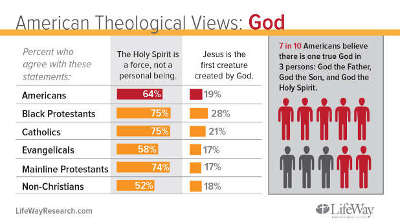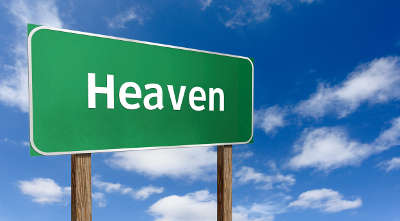Most Americans believe in heaven, hell and a few old-fashioned heresies.
Those are among the findings of a new study of American views about Christian theology from Nashville-based LifeWay Research.
Americans also disagree about mixing religion and politics and about the Bible. And few pay much heed to their pastor’s sermons or see themselves as sinners, according to the online survey of 3,000 Americans commissioned by Orlando-based Ligonier Ministries.
Stephen Nichols, chief academic officer of Ligonier Ministries, said the study was intended to “take the temperature of America’s theological health.”
Ligonier founder and chairman R.C. Sproul noted, “What comes screaming through this survey is the pervasive influence of humanism.”

Researchers asked 43 questions about faith, covering topics from sin and salvation to the Bible and the afterlife. They wanted to know how people in the pews—and people on the street—understand theology.
Many Americans get the basics right but are often fuzzy on the details, said Ed Stetzer, executive director of LifeWay Research.
“People like to believe in a generic Christian-ish god with cafeteria doctrines,” Stetzer said. “However, when we asked about harder beliefs—things that the church has [considered] and still considers orthodoxy—the numbers shift.”
Among the study’s findings:
Americans say heaven is a real place. But they disagree about who gets in.
Two-thirds of Americans (67 percent) believe heaven is a real place, according to the survey. That includes, following standard demographic categories, 9 in 10 black Protestants (88 percent) and evangelicals (90 percent), three-fourths of Catholics (75 percent) as well as a third of non-Christians (37 percent).
Just under half of Americans (45 percent) say there are many ways to heaven—which conflicts with traditional views about salvation being linked to faith in Jesus.
Catholics (67 percent) and mainline Protestants (55 percent) are most likely to say heaven’s gates are wide open with many ways in. Evangelicals (19 percent) and black Protestants (33 percent) are more skeptical.
About half of Americans (53 percent) say salvation is in Christ alone. Four in 10 (41 percent) say people who have never heard of Jesus can still get into heaven. And 3 in 10 (30 percent) say people will have a chance to follow God after they die.
Hell is a real place, too. But you have to be really bad to go there.
About 6 in 10 Americans (61 percent) say hell is real, according to the survey. Black Protestants (86 percent) and evangelicals (87 percent) are most likely to say hell is a real place. Catholics (66 percent) and mainline Protestants (55 percent) are less convinced.
Overall, Americans don’t seem too worried about sin or being sent to hell. Two-thirds (67 percent) told researchers that most people are basically good, even though everyone sins a little bit—an optimistic view of human nature at odds with traditional teaching about human sin.
Fewer than 1 in 5 Americans (18 percent) say even small sins should lead to damnation, while about half (55 percent) say God has a wrathful side.
When it comes to faith, Americans like a do-it-yourself approach.
Most Americans (71 percent), and in particular black Protestants (82 percent) and Catholics (87 percent), say people must contribute some effort toward their own salvation, the survey found. Two-thirds (64 percent) say in order to find peace with God, people have to take the first step, and then God responds to them with grace.
That sounds right to many people, Stetzer said, especially in our “pull yourself up by your bootstraps” culture. But, he noted, it doesn’t reflect the Christian idea that faith is a response to God’s grace.
Many Americans also don’t mind being disconnected from a local church. About half (52 percent) say worshipping alone or with family is as good as going to church.
About 4 in 5 respondents (82 percent) say their local church has no authority to “declare that I am not a Christian,” according to the survey. More than half (56 percent) believe their pastor’s sermons have no authority in their life, while slightly less than half (45 percent) say the Bible was written for each person to interpret as they choose.
Americans believe in the Trinity. But the details don’t reflect traditional views of orthodoxy.
About 7 in 10 Americans (71 percent) believe in the Trinity. That’s the idea that one God exists as three persons: Father, Son and Holy Spirit.
But few—even those in evangelical denominations—seem to grasp the details of how Christians have historically taught the Trinity. More than half of evangelicals (59 percent), for example, say the Holy Spirit is a force—not a personal being—according to the survey. Ten percent are not sure, while 31 percent agree the Holy Spirit is a person. Overall, two-thirds of Americans (64 percent) say the Holy Spirit is a force.
More than 1 in 7 Americans (15 percent) say the Holy Spirit is less divine than God the Father and Jesus. A third (33 percent) believe God the Father is more divine than Jesus. One in 5 (19 percent) say Jesus was the first creature made by God. All of those run counter to Christian doctrine as found in historic creeds of the church.
Some Americans like the Bible. Others are skeptical.
About half of Americans (48 percent) believe the Bible is the Word of God, the survey found. Four in 10 (43 percent) say the Bible is 100 percent accurate, while a similar share of Americans (41 percent) say it’s helpful but not literally true.
Evangelicals (76 percent) and black Protestants (67 percent) are most likely to say the Bible is accurate. Mainline Protestants (50 percent) and Catholics (49 percent) lean toward the Bible being helpful but not literally true.
The Bible is not the only religious text Americans disagree on. About half (54 percent) disagree when asked if the Book of Mormon is a revelation from God. About 10 percent say the Book of Mormon was revealed by God, while another 36 percent say they are not sure.
Americans disagree about sex, God and politics.
About 4 in 10 Americans (42 percent)—and more than half of non-Christians (55 percent)—say churches should remain silent about politics.
Among Christian groups, Catholics (47 percent) and mainline Protestants (44 percent) want less politics in church. Black Protestants (31 percent) and evangelicals (26 percent) are less likely to want their church to skip politics.
Less than half of Americans (48 percent) say sex outside of marriage is a sin. Christian groups are split on the topic, the survey found. Mainline Protestants (44 percent) and Catholics (40 percent) don’t see sex outside of marriage as sinful. Three-fourths of black Protestants (74 percent) and evangelicals (76 percent) believe it is.
The study’s overall results, Nichols said, show churches have a lot of work to do.
“This study demonstrates the stunning gap in theological awareness throughout our nation, in our neighborhoods, and even in the seat next to us at church,” Nichols says.
Bob Smietana is senior writer for Facts & Trends magazine. For the original article, visit lifewayresearch.com.
Methodology: A demographically balanced online panel was used for interviewing American adults. Three thousand surveys were completed from Feb. 25-March 5, 2014. The sample provides 95 percent confidence that the sampling error from the online panel does not exceed plus 1.8 percent. Margins of error are higher in subgroups. Slight weights were used to balance religion and gender and remove constant raters.
See an error in this article?
To contact us or to submit an article






















